Is role play just not cutting it for your training sessions anymore? Spencer Holmes has just the tonic.
Role play is dead, long live real play! For those of us who have always struggled with role playing in training, whether facilitator or learner, this may herald great tidings.
In the past year or so I have led a number of real-project learning experiences which I’d love to share with you.
I am also heavily involved in business simulations and do see the merit in those so my point about the death of role play is greatly exaggerated. Simulating has its place. Even when set into what they consciously know is an unreal situation, folks just can’t turn off those default responses. In completely fabricated scenarios I’ve still seen some very senior bottom lips tremble. But since moving to real play I am seeing so much more. So what’s involved?
Basically, we set people a real business problem to solve and use that as the basis for organic, real-time learning. This has created incredible results including:
- Improving a project process in a day and making it stick (in this case running post project reviews and use as business development opportunities)
- Linking a brand new middle management team to the exec and make a project plan to share vision with the organisation in two days
- Planning an entire sales strategy for a company’s French public sector customers in two days (literally working through the night without break) – this used to take two months
- Changing the culture of an SME, running efficient projects and improving cross-department collaboration resulting in a record-breaking revenue year (that one took four months on and off and they are now well into their second stellar year)
- Achievement of four-fold ROI in costs savings against training cost (that took three months with six days ‘training’ in total)
One of the briefs for an event was simply ‘generate and execute a business improvement that achieves at least double the investment in the training’ – (they ended up quadrupling it in the first year with incremental savings forecast for future years as the improvement was to be taken across the firm)
All of these had similar traits:
- Start with a baseline measure so we could measure progress
- Use psychometrics to base personal and behavioural feedback on a consistent framework – usually our own project leadership test www.thepsychometrictest.com
- Requirement to solve a real problem within the constraints set (usually very little time, no budget, often geographically dispersed teams)
- Groups start as individuals with little knowledge of each other, from different parts of the business, and end as cohesive team
- There is a real client, usually all or some of the exec board who will be presented to at the end of the event, there is no escape and no room for faking it
Some of the creative things I’ve done/seen in these situations:
- Bring in board members for impromptu skype meeting half way through
- Run ‘turbo sessions’ during the longer campaigns where teams meet and set themselves outrageous goals to move their projects forward, hammering phones and being ten times more productive than the average day
- Bring in live clients and suppliers for all or some of the workshops
- The spontaneous development of a ‘freshers fair’ in one of the business to break down the departmental silos that had been identified
- One Frenchman presenting to his board dressed only in the tricolour flag (something about bringing passion back into the sales team)
No two events are the same and I never know where they’ll end up. But a funny thing happens when you genuinely treat adults like adults in a training environment – they surprise you, themselves and their colleagues. They far outstretch anything they would have done at work that day, week, month or possibly ever. Genuine emotion in every form gets expressed and real learning takes place and, as my colleague Mike Brown often says "without anyone getting cold and wet."
Of course we need to intervene at the right moments to capture and reflect back key things we observe and usually that comes either with some project management or behavioural input which can be immediately acted upon, but don’t go in with a script.
Unquestionably these have been the most rewarding programmes in which I have ever been involved, both from a developmental and direct ROI perspective. No longer do we have to pretend to be awkward or unsure customers – we can bring in real ones.
- Real problems
- Real emotion
- Real honesty
- Real ROI
- Real results
- Real play
Spencer Holmes heads up Global Project Leaders Ltd, an organisation bent on developing leadership capability amongst project professional
Is role play just not cutting it for your training sessions anymore? Spencer Holmes has just the tonic.
Role play is dead, long live real play! For those of us who have always struggled with role playing in training, whether facilitator or learner, this may herald great tidings.
In the past year or so I have led a number of real-project learning experiences which I'd love to share with you.
I am also heavily involved in business simulations and do see the merit in those so my point about the death of role play is greatly exaggerated. Simulating has its place. Even when set into what they consciously know is an unreal situation, folks just can't turn off those default responses. In completely fabricated scenarios I've still seen some very senior bottom lips tremble. But since moving to real play I am seeing so much more. So what's involved?
Basically, we set people a real business problem to solve and use that as the basis for organic, real-time learning. This has created incredible results including:
- Improving a project process in a day and making it stick (in this case running post project reviews and use as business development opportunities)
- Linking a brand new middle management team to the exec and make a project plan to share vision with the organisation in two days
- Planning an entire sales strategy for a company's French public sector customers in two days (literally working through the night without break) - this used to take two months
- Changing the culture of an SME, running efficient projects and improving cross-department collaboration resulting in a record-breaking revenue year (that one took four months on and off and they are now well into their second stellar year)
- Achievement of four-fold ROI in costs savings against training cost (that took three months with six days 'training' in total)
One of the briefs for an event was simply 'generate and execute a business improvement that achieves at least double the investment in the training' - (they ended up quadrupling it in the first year with incremental savings forecast for future years as the improvement was to be taken across the firm)
All of these had similar traits:
- Start with a baseline measure so we could measure progress
- Use psychometrics to base personal and behavioural feedback on a consistent framework – usually our own project leadership test www.thepsychometrictest.com
- Requirement to solve a real problem within the constraints set (usually very little time, no budget, often geographically dispersed teams)
- Groups start as individuals with little knowledge of each other, from different parts of the business, and end as cohesive team
- There is a real client, usually all or some of the exec board who will be presented to at the end of the event, there is no escape and no room for faking it
Some of the creative things I've done/seen in these situations:
- Bring in board members for impromptu skype meeting half way through
- Run 'turbo sessions' during the longer campaigns where teams meet and set themselves outrageous goals to move their projects forward, hammering phones and being ten times more productive than the average day
- Bring in live clients and suppliers for all or some of the workshops
- The spontaneous development of a 'freshers fair' in one of the business to break down the departmental silos that had been identified
- One Frenchman presenting to his board dressed only in the tricolour flag (something about bringing passion back into the sales team)
No two events are the same and I never know where they'll end up. But a funny thing happens when you genuinely treat adults like adults in a training environment - they surprise you, themselves and their colleagues. They far outstretch anything they would have done at work that day, week, month or possibly ever. Genuine emotion in every form gets expressed and real learning takes place and, as my colleague Mike Brown often says "without anyone getting cold and wet."
Of course we need to intervene at the right moments to capture and reflect back key things we observe and usually that comes either with some project management or behavioural input which can be immediately acted upon, but don't go in with a script.
Unquestionably these have been the most rewarding programmes in which I have ever been involved, both from a developmental and direct ROI perspective. No longer do we have to pretend to be awkward or unsure customers - we can bring in real ones.
- Real problems
- Real emotion
- Real honesty
- Real ROI
- Real results
- Real play
Spencer Holmes heads up Global Project Leaders Ltd, an organisation bent on developing leadership capability amongst project professional







